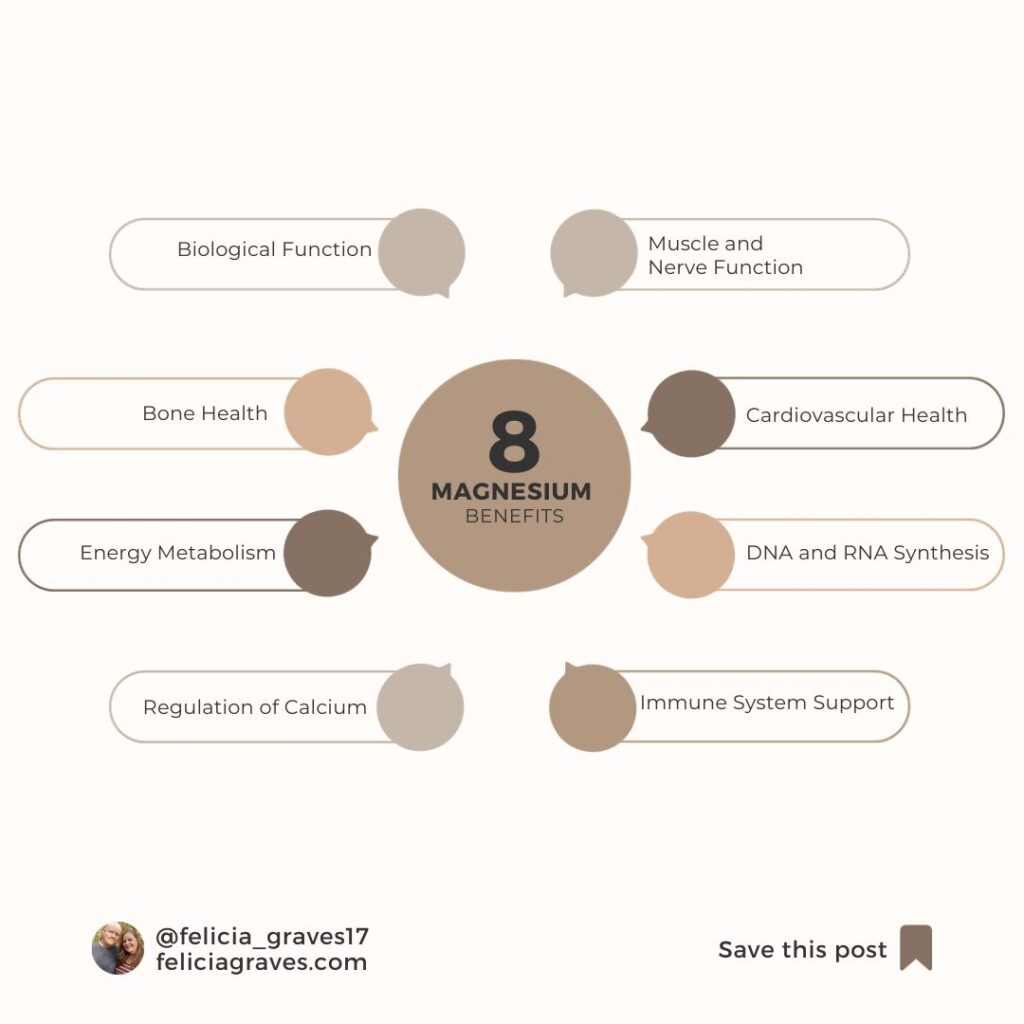Magnesium is a chemical element that is required by the human body for various physiological functions. Everyone, including autistic children, need magnesium as it plays a crucial role in numerous biochemical and biological processes.
I was first introduced to the idea of using magnesium supplementation for my son by our pediatrician. Like many parents of children diagnosed with autism spectrum disorder I was desperate to help my child get the sleep that his body needed. Let’s be honest I was also getting pretty desperate to get the sleep I needed as well. We had tried a low dose of melatonin and while that did help my son fall asleep he would not stay asleep for the duration of the night. Once the melatonin wore off, always around 2 or 3 in the morning, he would be wide awake and ready to party. In addition, I know there are research studies that show concerns about using melatonin over an extended period of time and I wasn’t willing to just trade one problem for another. Our family needed a real solution and some real sleep.
What I found out after first looking into starting magnesium supplements is that magnesium is really a powerhouse in the body. In fact, it is the fourth most abundant mineral in the human body. We all need this essential mineral and when we do not have enough magnesium there are clear side effects.
Discloser Note:
This post may contain affiliate links, which means I make a small commission at no extra cost to you. See my full disclosure here.

Table Of Contents:
- What Is Magnesium?
- How To Obtain Magnesium Without Supplementation
- Magnesium Supplementation For Autistic Children
- How Does Magnesium Help Autism?
- What Type Of Magnesium Is Best For Children With Autism?
- My Personal Experience Using Magnesium In An Autistic Child
- Best Magnesium Supplements For Autistic Individuals
What Is Magnesium?
Magnesium is a versatile and essential mineral that plays a wide range of roles in the body. It is one of the essential minerals required for the proper functioning of the human body. Magnesium is abundant in nature and plays a vital role in various biological processes.
Key Aspects Of Magnesium:
- Biological Function: Magnesium is involved in hundreds of enzymatic reactions in the body. It acts as a cofactor for enzymes that facilitate various biochemical processes, including energy production, DNA replication and repair, muscle contraction, and nerve function.
- Muscle and Nerve Function: Magnesium is crucial for neuromuscular function. It helps regulate the electrical impulses that control muscle contractions and nerve signaling. Adequate magnesium levels are necessary for normal muscle function and the transmission of nerve signals.
- Bone Health: Approximately 60% of the body’s magnesium is stored in the bones. It plays a role in maintaining bone density and structure, making it important for overall bone health.
- Cardiovascular Health: Magnesium is involved in maintaining a regular heartbeat and blood pressure. It helps relax blood vessels and can contribute to cardiovascular health.
- Energy Metabolism: Magnesium is a key component in the production of adenosine triphosphate (ATP), which is the body’s primary source of energy. It is involved in the metabolism of carbohydrates, fats, and proteins.
- DNA and RNA Synthesis: Magnesium is required for the synthesis and stability of DNA and RNA molecules, which are essential for genetic information transfer and cell function.
- Regulation of Calcium: Magnesium helps regulate calcium levels in the body. It can prevent excessive calcium buildup in cells and tissues, which is important for muscle and nerve function, as well as bone health.
- Immune System Support: Some research suggests that magnesium may play a role in supporting the immune system and reducing inflammation.
As with any nutrient, maintaining the right balance is crucial, as both magnesium deficiency and excessive intake can have adverse effects on health. If you have concerns about your magnesium levels or are considering supplementation, it’s advisable to consult with a healthcare professional. They can assess your individual needs and provide guidance on the appropriate course of action.

How To Obtain Magnesium Without Supplementation
- Leafy Greens: Dark, leafy greens like spinach, kale, Swiss chard, and collard greens are excellent sources of magnesium.
- Nuts and Seeds: Almonds, peanuts, cashews, and pumpkin seeds are high in magnesium content.
- Whole Grains: Whole grains like brown rice, quinoa, whole wheat bread, and oatmeal are good sources of magnesium.
- Legumes: Beans, lentils, and peas, including black beans, kidney beans, and chickpeas, provide magnesium.
- Avocado: Avocado is a magnesium-rich fruit.
- Fish: Some fish, such as mackerel, salmon, and halibut, contain magnesium.
- Bananas: Bananas are a fruit that contains magnesium.
- Dairy Products: Dairy foods like yogurt and milk have magnesium, although the magnesium content can vary.
- Dark Chocolate: Dark chocolate with a high cocoa content is a source of magnesium.
- Tofu: Tofu, a soy-based product, contains magnesium.
- Vegetables: Other vegetables like potatoes, peas, and broccoli also contain magnesium, although typically in smaller amounts than leafy greens.
- Whole Wheat Pasta: Whole wheat pasta is a source of magnesium.
- Water: Depending on the source, drinking water can contribute to your daily magnesium intake, especially if it’s “hard” water with a higher mineral content.
It’s essential to maintain a balanced diet that includes a variety of these magnesium-rich foods to ensure you get an adequate intake of this mineral. The recommended daily intake of magnesium varies depending on age, sex, and other factors, but it generally falls in the range of 310-420 milligrams for adults.
If you have specific dietary restrictions, allergies, or health conditions that affect your magnesium absorption, you should consult with a healthcare provider or a registered dietitian to ensure you meet your magnesium needs. In some cases, supplementation may be recommended, but this should always be done under the guidance of a healthcare professional, as excessive magnesium intake can have adverse effects on health.

Magnesium Supplementation For Autistic Children
Before you begin supplementing with magnesium it is important to know that a child being autistic does not automatically mean that he or she is deficient in magnesium. Every child, regardless of diagnosis, is a person first. No two people will have the exact same medical needs. Some children with autism may have magnesium deficiencies, while others may not.
Excessive magnesium intake can lead to diarrhea or other side effects, so it’s crucial to determine the child’s magnesium status before starting supplementation.
Furthermore, the effectiveness of magnesium supplementation in improving autism symptoms can vary greatly from one individual to another. What works for one child may not work for another, and it should not replace evidence-based interventions and therapies recommended by healthcare providers.
How Does Magnesium Help Autism?
Here are some ways in which magnesium may be thought to help children with autism:
Regulation of Nervous System Activity
Magnesium is involved in the regulation of neurotransmitters and nerve function. Some researchers have proposed that magnesium supplements may help calm hyperactive behavior and improve attention and focus in children with ASD.
Reducing Sensory Sensitivities
Some children with autism have heightened sensory sensitivities, such as sensitivity to lights, sounds, or textures. Magnesium’s potential calming effects may help reduce sensory sensitivities in some individuals.
Sleep Improvement
Many children with autism experience sleep disturbances. Magnesium has been suggested to support better sleep quality and may help some children with autism establish more regular sleep patterns.
Stress and Anxiety Reduction
Magnesium is known to have a calming effect on the nervous system, which could potentially help reduce anxiety and stress levels in children with ASD.
Supporting Gut Health
There is a growing body of research on the gut-brain connection and its potential relevance to autism. Magnesium may play a role in maintaining gut health, which could indirectly benefit children with autism.

What Type Of Magnesium Is Best For Children With Autism?
The choice of the best type of magnesium supplement depends on individual needs and considerations, as different forms of magnesium have varying absorption rates and potential benefits. Here are some common types of magnesium supplements and their characteristics:
- Magnesium Citrate: Magnesium citrate is one of the most commonly used forms of magnesium supplements. It is well-absorbed by the body and is often recommended for individuals with constipation because it can have a laxative effect.
- Magnesium Glycinate: Magnesium glycinate is a highly absorbable form of magnesium. It is less likely to cause gastrointestinal side effects like diarrhea compared to magnesium citrate, making it a good choice for those with sensitive stomachs.
- Magnesium Oxide: Magnesium oxide has a high magnesium content, but it is less absorbable than some other forms. It is often used to address magnesium deficiencies but may have a higher risk of causing diarrhea in some individuals.
- Magnesium Chloride: Magnesium chloride is well-absorbed by the body and is often used in topical magnesium products like magnesium oil. It can also be taken orally.
- Magnesium Sulfate (Epsom Salts): Epsom salt is a form of magnesium sulfate that is typically used in baths for relaxation and muscle soreness. It is not typically used as an oral supplement.
- Magnesium L-Threonate: This form of magnesium has been specifically studied for its potential to cross the blood-brain barrier, which may make it more effective for neurological and cognitive benefits. However, it is less commonly available and more expensive than other forms.
- Magnesium Malate: Magnesium malate is a combination of magnesium and malic acid. It is sometimes used for conditions related to muscle pain and fatigue.
- Magnesium Taurate: Magnesium taurate is a form of magnesium combined with the amino acid taurine. It is sometimes used for cardiovascular health support.
When choosing a magnesium supplement, consider the following factors:
- Purpose: Determine why you are taking a magnesium supplement. Different forms may be better suited for specific purposes, such as addressing constipation, promoting relaxation, or supporting overall magnesium intake.
- Tolerance: Some individuals may have sensitivities to certain forms of magnesium, leading to gastrointestinal upset or diarrhea. If you have a history of digestive issues with magnesium supplements, a less laxative form like magnesium glycinate may be a better choice.
- Absorption: Consider the bioavailability of the magnesium form. Highly absorbable forms like magnesium citrate or magnesium glycinate may be preferred when addressing magnesium deficiency.
- Cost: The cost of magnesium supplements can vary significantly depending on the form and brand. Evaluate your budget when selecting a supplement.
- Consult a Healthcare Provider: If you have specific health concerns or conditions, consult with a healthcare provider or a registered dietitian. They can recommend the most suitable form of magnesium based on your individual needs and health status.
Ultimately, the “best” form of magnesium depends on your personal health goals and any specific considerations you may have.
My Personal Experience Using Magnesium In An Autistic Child
As I mentioned before my main goal when it came to starting a magnesium supplement was related to sleep. Quality sleep is so important for brain development and brain function and I know that in the same way I can handle daily tasks and social interaction better after a good night’s sleep the same would be true for my son. I did not look at a magnesium supplement as a treatment of autism but rather as dietary supplements that would help my sweet boy get all of the essential nutrients that he needs. My child’s diet is limited due to sensory aversions so using nutritional supplements seemed like an easy way to prevent any nutritional deficiencies.
Since we began using magnesiums supplements I have witnessed significant improvements in the length and quality of sleep that my son is getting. It’s clear to me now that his low magnesium levels were causing a major problem for him when it came to his quality of sleep as well as regulating his nervous system. Other positive effects that I have noticed are an improvement in his cognitive function (concentration, speech initiation, etc).
I have also seen the benefits of magnesium in myself. Once I gained a better understanding of magnesium I saw that I too had signs of magnesium deficiency. I find myself more calm and less anxious after including more magnesium in my own diet in recent years.
Best Magnesium Supplements For Autistic Individuals
There are three main supplements that I prefer for both my children and myself when it comes to supplementing with magnesium.
Kid Safe Magnesium Oil Roller

This roller could not be easier to use which is really why it makes the top of the list. Every evening as part of our bedtime routine we use this oil roller to apply magnesium oil to the bottoms of feet and between the shoulder blades. Both of my kids enjoy this and think it is hysterical because of how much the roller tickles their feet.
Dr Teal’s Kids Gentle Epsom Salt

Our entire bathroom and hallway smells incredible from using this epsom salt bath. Another super simple way to get in a little extra magnesium because my kids love playing in the bathtub. I love the added benefit of lavender essential oils that are fragrant and relaxing which is perfect for bedtime.
Natural Vitality Calm, Magnesium Citrate Supplement

Admittedly my kids aren’t huge fans of this drink mix because it makes the water a bit fizzy however I absolutely love the stuff. There are several different flavor options to choose from and it makes such a nice evening drink. I like to mix some up for myself after putting the kids to bed to help myself unwind for the day and to promote good sleep hygiene.
Magnesium And Autism
Magnesium is not a cure for autism, or any other condition, but it is a valuable part of a balanced diet and may help support various aspects of children’s health and development when used appropriately. Adequate magnesium intake can support healthy growth and development, particularly in children. It may help regulate sleep patterns, reduce anxiety and stress, and improve focus and attention in some individuals. However, it’s essential to use magnesium appropriately and under the guidance of a healthcare professional, as excessive intake can lead to adverse effects.
Embracing Neurodiversity:
It is important to understand that autism is not a disease; it’s simply a different way of experiencing the world. Autism is a part of a person’s identity, and it’s not something negative or bad. It’s crucial to embrace neurodiversity and recognize that there is no “cure” for autism because it’s not an illness. Instead, our focus should be on supporting and respecting individuals with autism, celebrating their unique strengths, and helping create a more inclusive and understanding society. The information, tips, and advice on this website are based on my personal experience but no two children are the same. What works for our family may not work for yours. No material on this site is intended to be a substitute for professional medical advice, diagnosis or treatment.


Leave a Reply